Tool List
Top AI Tools For SEO
AI tools for SEO leverage advanced algorithms to enhance search engine optimization efforts. These tools analyze data, predict trends, and recommend strategies, streamlining SEO tasks. Benefits include improved keyword research, content optimization, and competitor analysis, leading to higher search rankings and organic traffic. Costs vary, with basic plans starting at around $50 per month, while comprehensive suites can cost over $500. AI tools are essential for modern SEO because they can process vast amounts of data quickly and provide actionable insights, making them indispensable for maximizing SEO efficiency and effectiveness.
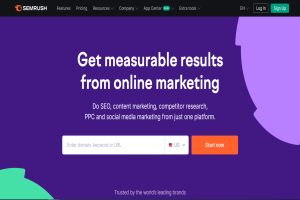
Semrush
Do SEO, content marketing, competitor research, PPC and social media marketing from just one platform.
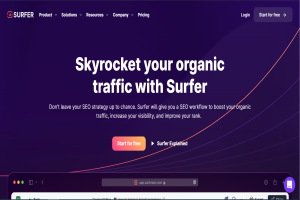
SurferSEO
Don't leave your SEO strategy up to chance. Surfer will give you a SEO workflow to boost your organic traffic, increase...
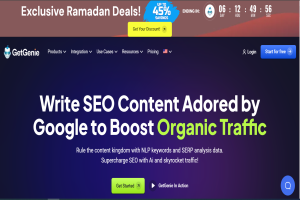
Getgenie
Rule the content kingdom with NLP keywords and SERP analysis data. Supercharge SEO with Ai and skyrocket traffic!
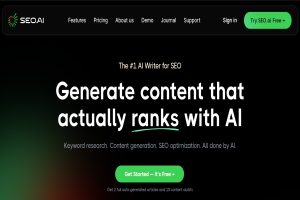
Seo AI
Keyword research. Content generation. SEO optimization. All done by AI.
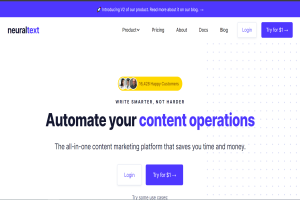
Neural text
The all-in-one content marketing platform that saves you time and money.
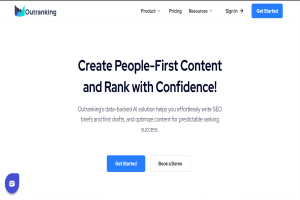
Outranking
Outranking’s data-backed AI solution helps you effortlessly write SEO briefs and first drafts, and optimize content for...
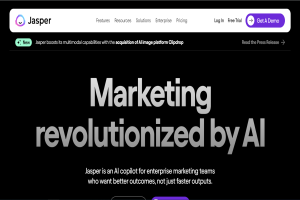
Jasper
Jasper is an AI copilot for enterprise marketing teams who want better outcomes, not just faster outputs.

Diib
Everything was really clear and easy! I feel much more informed about what is going on with my website now and I feel li...
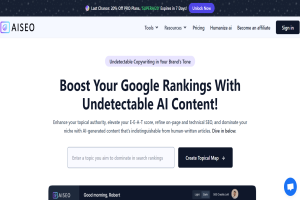
AISeo
Enhance your topical authority, elevate your E-E-A-T score, refine on-page and technical SEO, and dominate your niche wi...
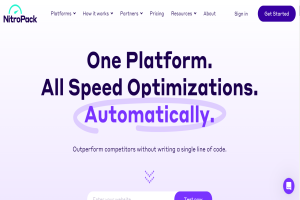
Nitropack
Outperform competitors without writing a single line of code.
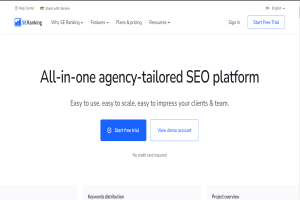
Seranking
Easy to use, easy to scale, easy to impress your clients & team.

AI in Digital Marketing: How it Works?
Artificial intelligence (AI) is a powerful tool that helps businesses in digital marketing. It can change how brands interact with...
Read More
How to Use AI for SEO
IntroductionDefinition of SEOSearch Engine Optimization (SEO) refers to the process of enhancing the visibility and ranking of a w...
Read MoreFrequently Asked Questions
AI tools for SEO utilize artificial intelligence to optimize websites for search engines. They can automate tasks like keyword research, content creation, and link building, helping improve a site's search engine rankings more efficiently.
AI tools analyze large datasets to identify trending keywords, understand search intent, and suggest long-tail keywords that might be less competitive but highly relevant, thus improving the strategy’s precision.
Yes, AI can generate content that is both reader-friendly and optimized for search engines. These tools use natural language processing to ensure the text is relevant, coherent, and includes targeted keywords effectively.
AI tools can identify potential link-building opportunities by analyzing link profiles of competitor websites. They suggest high-quality, relevant sites for backlinking, streamlining the outreach process.
AI tools help optimize on-page elements like meta tags, headings, and images. They can suggest improvements and automate adjustments to enhance page structure and content relevancy.
AI assists in identifying technical issues on a website, such as broken links, slow page load times, and crawl errors. These tools can prioritize issues based on their impact on SEO, guiding webmasters on what to fix first.
Yes, by analyzing search data and patterns, AI tools can forecast changes in user behavior and search engine algorithms, helping businesses adapt their SEO strategies proactively.
AI analyzes user behavior, location, device, and interaction with the website to tailor SEO strategies that target specific segments of an audience, increasing the effectiveness of the campaigns.
Traditional SEO tools typically require more manual intervention and rely heavily on user inputs. AI-driven tools, however, leverage machine learning and data analysis to automate processes and provide insights more efficiently.
Yes, issues like content authenticity and transparency arise when using AI-generated content. It’s crucial to maintain ethical standards by ensuring content quality and disclosing AI involvement where appropriate.
AI tools optimize local SEO by analyzing location-based data to enhance local keyword targeting, optimize Google My Business listings, and improve local citations effectively.
Absolutely. AI tools can track competitors’ SEO activities, including keyword targeting, content strategy, and backlink profile, providing insights to refine your own strategy.
While the initial investment might be higher, AI SEO tools can be more cost-effective in the long run due to their efficiency, ability to scale, and precision in handling repetitive tasks.
The future of AI in SEO looks promising, with advancements likely focusing on deeper personalization, predictive analytics, and more autonomous SEO management systems.
When choosing an AI SEO tool, consider factors such as the specific SEO needs of your business, the tool’s compatibility with your existing tech stack, the quality of customer support, and user reviews to ensure it meets your requirements.
Frequently Asked Questions
Q: What are AI tools for SEO?
A: AI tools for SEO utilize artificial intelligence to optimize websites for search engines. They can automate tasks like keyword research, content creation, and link building, helping improve a site's search engine rankings more efficiently.
Q: How do AI tools improve keyword research?
A: AI tools analyze large datasets to identify trending keywords, understand search intent, and suggest long-tail keywords that might be less competitive but highly relevant, thus improving the strategy’s precision.
Q: Can AI tools write SEO-friendly content?
A: Yes, AI can generate content that is both reader-friendly and optimized for search engines. These tools use natural language processing to ensure the text is relevant, coherent, and includes targeted keywords effectively.
Q: Are AI SEO tools reliable for link building?
A: AI tools can identify potential link-building opportunities by analyzing link profiles of competitor websites. They suggest high-quality, relevant sites for backlinking, streamlining the outreach process.
Q: What is the role of AI in on-page SEO?
A: AI tools help optimize on-page elements like meta tags, headings, and images. They can suggest improvements and automate adjustments to enhance page structure and content relevancy.
Q: How does AI contribute to technical SEO?
A: AI assists in identifying technical issues on a website, such as broken links, slow page load times, and crawl errors. These tools can prioritize issues based on their impact on SEO, guiding webmasters on what to fix first.
Q: Can AI tools predict SEO trends?
A: Yes, by analyzing search data and patterns, AI tools can forecast changes in user behavior and search engine algorithms, helping businesses adapt their SEO strategies proactively.
Q: How do AI tools personalize SEO strategies?
A: AI analyzes user behavior, location, device, and interaction with the website to tailor SEO strategies that target specific segments of an audience, increasing the effectiveness of the campaigns.
Q: What is the difference between AI-driven and traditional SEO tools?
A: Traditional SEO tools typically require more manual intervention and rely heavily on user inputs. AI-driven tools, however, leverage machine learning and data analysis to automate processes and provide insights more efficiently.
Q: Are there ethical concerns with using AI in SEO?
A: Yes, issues like content authenticity and transparency arise when using AI-generated content. It’s crucial to maintain ethical standards by ensuring content quality and disclosing AI involvement where appropriate.
Q: How do AI SEO tools handle local SEO?
A: AI tools optimize local SEO by analyzing location-based data to enhance local keyword targeting, optimize Google My Business listings, and improve local citations effectively.
Q: Can AI tools monitor and analyze competitor SEO strategies?
A: Absolutely. AI tools can track competitors’ SEO activities, including keyword targeting, content strategy, and backlink profile, providing insights to refine your own strategy.
Q: How cost-effective are AI SEO tools?
A: While the initial investment might be higher, AI SEO tools can be more cost-effective in the long run due to their efficiency, ability to scale, and precision in handling repetitive tasks.
Q: What is the future of AI in SEO?
A: The future of AI in SEO looks promising, with advancements likely focusing on deeper personalization, predictive analytics, and more autonomous SEO management systems.
Q: How should one choose an AI SEO tool?
A: When choosing an AI SEO tool, consider factors such as the specific SEO needs of your business, the tool’s compatibility with your existing tech stack, the quality of customer support, and user reviews to ensure it meets your requirements.
Frequently Asked Questions
Q: What are AI tools for SEO?
A: AI tools for SEO utilize artificial intelligence to optimize websites for search engines. They can automate tasks like keyword research, content creation, and link building, helping improve a site's search engine rankings more efficiently.
Q: How do AI tools improve keyword research?
A: AI tools analyze large datasets to identify trending keywords, understand search intent, and suggest long-tail keywords that might be less competitive but highly relevant, thus improving the strategy’s precision.
Q: Can AI tools write SEO-friendly content?
A: Yes, AI can generate content that is both reader-friendly and optimized for search engines. These tools use natural language processing to ensure the text is relevant, coherent, and includes targeted keywords effectively.
Q: Are AI SEO tools reliable for link building?
A: AI tools can identify potential link-building opportunities by analyzing link profiles of competitor websites. They suggest high-quality, relevant sites for backlinking, streamlining the outreach process.
Q: What is the role of AI in on-page SEO?
A: AI tools help optimize on-page elements like meta tags, headings, and images. They can suggest improvements and automate adjustments to enhance page structure and content relevancy.
Q: How does AI contribute to technical SEO?
A: AI assists in identifying technical issues on a website, such as broken links, slow page load times, and crawl errors. These tools can prioritize issues based on their impact on SEO, guiding webmasters on what to fix first.
Q: Can AI tools predict SEO trends?
A: Yes, by analyzing search data and patterns, AI tools can forecast changes in user behavior and search engine algorithms, helping businesses adapt their SEO strategies proactively.
Q: How do AI tools personalize SEO strategies?
A: AI analyzes user behavior, location, device, and interaction with the website to tailor SEO strategies that target specific segments of an audience, increasing the effectiveness of the campaigns.
Q: What is the difference between AI-driven and traditional SEO tools?
A: Traditional SEO tools typically require more manual intervention and rely heavily on user inputs. AI-driven tools, however, leverage machine learning and data analysis to automate processes and provide insights more efficiently.
Q: Are there ethical concerns with using AI in SEO?
A: Yes, issues like content authenticity and transparency arise when using AI-generated content. It’s crucial to maintain ethical standards by ensuring content quality and disclosing AI involvement where appropriate.
Q: How do AI SEO tools handle local SEO?
A: AI tools optimize local SEO by analyzing location-based data to enhance local keyword targeting, optimize Google My Business listings, and improve local citations effectively.
Q: Can AI tools monitor and analyze competitor SEO strategies?
A: Absolutely. AI tools can track competitors’ SEO activities, including keyword targeting, content strategy, and backlink profile, providing insights to refine your own strategy.
Q: How cost-effective are AI SEO tools?
A: While the initial investment might be higher, AI SEO tools can be more cost-effective in the long run due to their efficiency, ability to scale, and precision in handling repetitive tasks.
Q: What is the future of AI in SEO?
A: The future of AI in SEO looks promising, with advancements likely focusing on deeper personalization, predictive analytics, and more autonomous SEO management systems.
Q: How should one choose an AI SEO tool?
A: When choosing an AI SEO tool, consider factors such as the specific SEO needs of your business, the tool’s compatibility with your existing tech stack, the quality of customer support, and user reviews to ensure it meets your requirements.